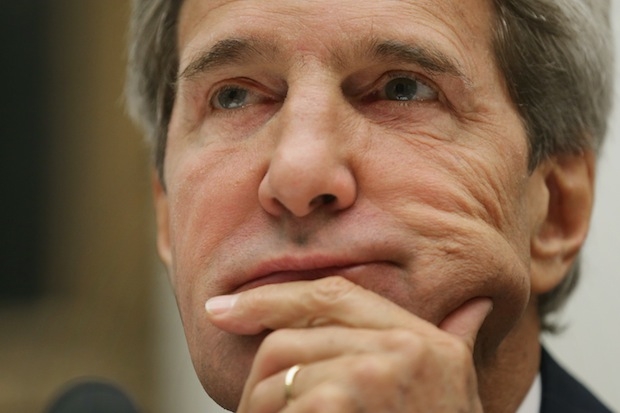The Syrian rebels who liberated the mountain village of Maaloula apparently immediately set about converting the predominantly Christian population to Islam, using the gently persuasive techniques we have come to associate with this dynamic and expanding religion.
‘Allahu Akbar! Either you will convert to Islam or you will be beheaded,’ rebels allegedly told some villagers. Other residents were simply shot dead without all the onerous conversion palaver. It is said that the accents of the rebel soldiers were many things — Chechen, Tunisian, Moroccan, etc — but certainly not Syrian. It was further reported that, once again, the rebels were drawn from one or another al-Qa’eda franchise; as John O’Sullivan wrote here last week, we are backing the losing side of the losing side in Syria. Have you heard anything from the moderate Syrian rebels? What exactly is their disposition? Are they consensual centre-left democrats, people who don’t wish to nationalise the top 200 companies but feel a little bit iffy about the bedroom tax? Nobody seems to know.
As it happens, the enforced conversions in the village of Maaloula may be a cause for optimism. It might just be that the jihadis are becoming slightly more civilised — because at least this time they didn’t try to eat their victims. Or perhaps this is deluding and a false dawn, and it’s simply that on this occasion they were not very hungry.
Either way one can only imagine their delight at being told they had John Kerry right alongside them as an ally. The West, still in thrall to Blairite notions of aggressive liberal evangelism, despite all the abject misery and deaths this ideology has spawned, becomes ever more absurd in its tin sabre-rattling, and of course for absurdity, nobody has come close to Mr Kerry. The US secretary of state announced — to undoubted whimpers of terror in Damascus — that any military strike taken against President Assad would be an ‘unbelievably small, limited kind of effort’. Has a major international politician anywhere, ever, said anything quite so stupid? It was in effect telling Assad: ‘If you do not renounce chemical weapons we will subject you to an entirely inconsequential punishment which you may not even notice. So watch out.’ If it were to be so small, this strike, so negligible, what would be the point of it? Would it help to reduce the death toll, which mounts hourly, in that benighted country? If so, how, exactly? Now, after Russia’s diplomatic intervention, Syria looks like being spared America’s microscopic wrath. And Obama wriggles free from an embarrassing defeat, for the moment.
John Kerry’s wish, I suppose, was to reassure his country’s politicians and public that the US was not about to get itself into another Iraq mess. Much as is the case in Britain, the US leadership was faced with a public and a majority of its politicians opposed to military action of any kind, and the alleged chemical weapons attack on the outskirts of Damascus, perpetrated by Assad’s soldiers, with or without his permission, is not remotely sufficient to persuade them otherwise. If you believe the Americans, this attack killed 1,429 people, including a significant number of children. But for the public and the politicians it is a case of once bitten twice shy: we remember the fury and fear whipped up ten years ago about Saddam Hussein’s alleged weapons of mass destruction, which did not actually exist, and many will be thinking that we shouldn’t fall for the same trick again. I was reminded of this by a diagram in one of our morning newspapers supposedly informing me that Assad could launch a WMD attack against Our Bases In Cyprus. Now, remind me, where have I heard that sensationalist garbage before?
Beneath this sort of collective déjà vu, there is greater cynicism than before about WMD generally: is it any worse to be killed by a tub of Sarin nerve gas than it is to be killed by a pig falling from a balcony? Discuss. Why the anger about the 1,429 killed, rather than the deaths of the 98,000-odd by the somehow more agreeable ‘conventional’ means which preceded the outrage? Hoping that the public will believe that there is something intrinsically more sinister about chemical weapons than high explosives does not do the business any more. We are more thoughtful, as a people, now about the grotesque hypocrisies at work within this liberal evangelism. We know which countries possess 98 per cent of the world’s weapons of mass destruction, and it ain’t Syria or Iraq. We are aware that the USA has used chemical weapons and aided the Iraqis in using chemical weapons against the Iranians with the use of satellite imagery.
And I suspect that there is a greater sense of unease now about the so-called Arab Spring, of which the rebellion against Assad was a part. Are the people in any of the countries which participated in this Arab Spring markedly better off now than they were when languishing under the old tyrants? And secondly, have our military interventions improved things for the people of the countries we attacked and, pragmatically, are we safer as a consequence of the changes we have wrought? I suspect the public looks at Iraq and Afghanistan and concludes that it might have been better had we not got ourselves involved. Last month, 800 people were killed in Iraq as a consequence of insurrection and internecine violence. Ten years on and still more people are being killed than would have been killed by Saddam.







Comments